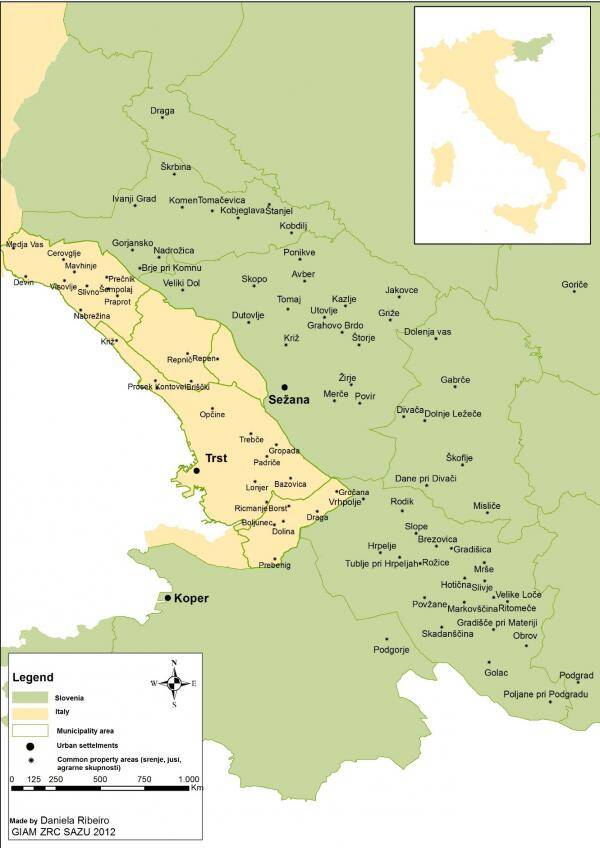Research
This case story describes the context of the village commons in the Karst region. Romina Rodela’s research environmental governance focused on this region, considering participatory processes and exploring the way these relate and influence resource management practices as well as governance arrangements, and vice-versa, with a special focus on the aspect of collective action for environmental protection. The Karts area has been selected for this research because of its specific context.
Environmental context
The Karst is a limestone plateau of about 550 square kilometers that extends from the Trieste Gulf in the North East of Italy to the Vipava valley in Southwest-Slovenia. It is formed by carbonate rocks that are water-soluble and enable the immediate infiltration of water into the underground system and is a fragile natural area that hosts natural habitats protected under national laws (natural reserves) as well as European directives (the Habitat Directive). In recent years the Karst was subject to substantial anthropogenic pressures that include large infrastructural projects e.g., industrial zones, highway, and urbanization (e.g., new settlements). Numerous studies report about the implications of human-induced pressures and warn against negative effects on karst hydrology. Given the high vulnerability of this natural area, the study of man-nature interaction is of great interest.
Map of the Karts region and its location in Italy and Slovenia. Map created and copyright by Daniele Ribeiro.
Institutional Context
The Karst also is a trans-boundary area that lies in both Slovenia and Italy. In the East, the management of natural resources is subject to Slovene institutions and law, while on the West it is subject to Italian law and institutions. In this context of research, interest is that on the Italian side of the Karst fully operating village commons can be found, which communities are where a group of native villagers owns collectively land, resources and real estate managed and used according to long-established practice. Accounting for the history of these territories where Slavic, Latin, and Germanic culture have mixed it is not a surprise that all of the members of these communities/village commons belong to the Slovene ethnic minority and have Slovene as the main language.
Also, on the Slovene side of the Karst landscape common property is found but due to the specifics of country history, this does not take the form of village commons. In the Slovene Karst, while (certain) natural resources are managed collectively, ownership (and thus responsibility) is individual. That is, on the Italian Karst common-pool resources are indivisible, while on the Slovene Karst common-pool resources are divisible.
Common-pool resources
Across the 33 village commons located on the Italian Karst, property is inalienable and it belongs to the household, more precisely the family group (communion familiari). The majority of the Natura 2000 sites of the Trieste Province are located on land owned by the village commons. Yet, also a good portion of the public infrastructure e.g., roads, highway, electrical grids, supplying nearby urban areas are cutting across land owned by the village commons. Village commons have an important role in the management of natural resources in the Karst.
More about Romina’s research can be found via ResearchGate.
Authored by Romina Rodela, Reseracher and coordinator of the research project Environmental Governance in Context at Södertörn University, Sweden. She is also collaborating in the NWO-project Assessing the Learning Effects of Games on Attitude of Stakeholders (ALEGAMS)) of Wageningen University and affiliated researcher of the Research Team Institutions for Collective Action at Utrecht University.


